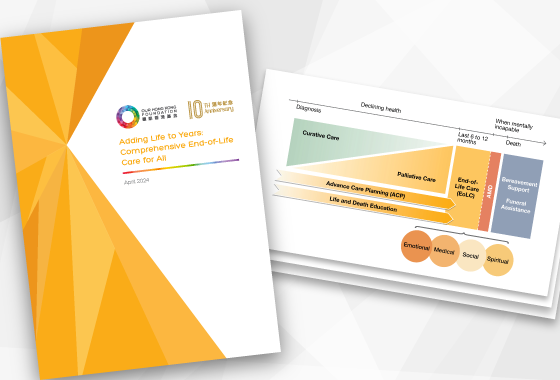Seeking Hope in the Pandemic: Strategic Purchasing
Authors: Queenie Li, Researcher, and Onno Ho, Research Intern, Our Hong Kong Foundation

As we enter the summer of 2020, it is not only the temperature in Hong Kong that has been rising, but also the newly confirmed cases of Covid-19 in the city. The advent of the third wave poses serious concerns, and social distancing measures are tightening under the government’s ‘Suppress and Lift’ policy. Hosting any gathering or meeting now seems an impossible task. Yet in July, an online roundtable discussion successfully brought together the former Secretary of Health, Welfare and Food and the current Secretary of Food and Health, the Chairman of the Hospital Authority, different institutional leaders, as well as local and international experts from the academia and the industry. What grabbed the attention of all these public health professionals during these unprecedented times?
The keyword here is ‘strategic purchasing’, a concept perhaps unfamiliar to the general public. Strategic purchasing aims to optimise health system performance, by deciding what should be purchased, how they should be purchased and from whom. In recent years, because of its comprehensive model of health financing, strategic purchasing is gaining currency in Hong Kong and the wider international community.

Strategic purchasing adopts a systematic approach, by analysing the overall healthcare demand of the entire population, setting service targets and choosing purchase mechanisms accordingly to improve care quality and cost-effectiveness. This meticulous process relies on well-designed regulatory and monitoring mechanisms and strives to maximise the efficiency of purchases through regular evaluation of services. It also ensures the accountability and transparency of service purchasers and providers. As the main facilitator of strategic purchasing, the government must formulate overarching policy objectives and select the best provision model for different services, also known as the ‘make-or-buy’ decisions. These considerations lie at the heart of what is called ‘active purchasing’.
The short-term and long-term implications of strategic purchasing
In Hong Kong, the public sector handles over 90% of inpatient cases, but employs only half of the doctors. Whilst public hospitals are reaching their full capacity, there are often empty beds in private hospitals, for people are deterred by their prohibitive fees. This mismatch between supply and demand is threatening our standard of healthcare services during the coronavirus outbreak.
Therefore, in the past few months, the Hospital Authority has been promoting public and private partnerships (PPPs). New collaborative programmes include the purchase of caesarean sections for women giving birth and radiotherapies for cancer patients with brain and bone metastases, allowing people to seek such treatments from private hospitals at public sector prices. At the roundtable, Henry Fan Hung-ling, Chairman of the Hospital Authority, admitted that such partnerships tend to be fragmented and limited to specific patients, so they are only short-term solutions for easing the burden on public hospitals.
Also present at the roundtable was Professor Eng-kiong Yeoh, Professor of Public Health and Director of Centre for Health Systems and Policy Research at the Jockey Club School of Public Health and Primary Care, Faculty of Medicine, the Chinese University of Hong Kong. He added on Fan’s opinions that most of the public-private partnerships in Hong Kong are counted as ‘passive purchasing’ and are usually designed for specific operations only without long-term vision. Such a piecemeal approach could potentially accelerate the fragmentation of the healthcare system.
Moving beyond Covid-19, we must rethink our implementation of strategic purchasing with the clear aim to fully exploit the potential of our health system. Strategic purchasing also has a long-term effect on propelling the development of primary care, which we will discuss in the next article.
To watch the roundtable ‘Health Financing in the 21st Century: The Public-Private Lever in Strategic Purchasing’, click here: https://www.facebook.com/watch/live/?v=302421424282679&ref=watch_permalink



